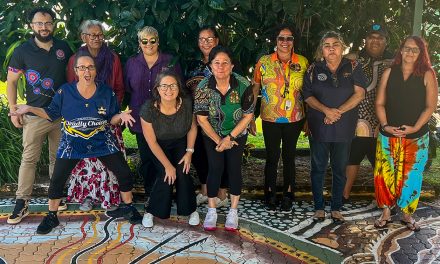A new review of autoimmune rheumatic disease (AIRD) in Aboriginal and Torres Strait Islander peoples reports significant gaps in medical knowledge regarding how common these illnesses are, phenotype (what symptoms or illness characteristics patients have) and disease outcomes among Indigenous Australians.
The review, led by Dr Fabien Vincent of the Rheumatology Research Group at Monash University, is the first step in a long-term research program aiming to ensure management of AIRD can be optimised for all Australians, including Aboriginal and Torres Strait Islander peoples.
Dr Vincent said there were multiple targeted therapies for AIRD approved for use in Australia, which could significantly improve treatment outcomes and that it was important to ensure all patients with AIRD could benefit from treatment advances in the future.
“Therefore, it’s important to understand the prevalence and potential phenotypic variations of AIRD across the Australian population,” he said.
AIRD is a collective term which comprises a group of multisystem inflammatory autoimmune illnesses, including connective tissue disease, such as lupus; chronic inflammatory arthritis, such as rheumatoid arthritis; sarcoidosis and systemic vasculitis.
Some AIRD are prevalent in the general population, and all can cause significant morbidity and reduced quality of life.
Some increase the risk of premature mortality such as lupus, a connective tissue disease that is more prevalent and severe in Aboriginal and Torres Strait Islander peoples.
Project researcher Dr Laura Eades said some of these illnesses were quite rare, and there were not many published studies compared to other fields of research such as diabetes or cardiovascular disease.
“When it comes to illnesses such as rheumatoid arthritis, is it more or less common in Aboriginal and Torres Strait Islander peoples, or are there particular outcomes that are worse or better?” she asked.
“We don’t have enough information on how Aboriginal and Torres Strait Islander peoples are affected or what the characteristics of their illness are. We want to know if there are any areas where we can be doing better.”
The researchers conducted a review of published literature on databases MEDLINE and EMBASE; Google Scholar; the Australian Institute of Health and Welfare; and the Australian Bureau of Statistics websites.
The research found:
- Very little is known about AIRD other than lupus in Australian Aboriginal and Torres Strait Islander peoples.
- There are no longitudinal studies of AIRD other than lupus in Aboriginal and Torres Strait Islander peoples.
- Further research into AIRD in Aboriginal and Torres Strait Islander peoples is needed to ensure that health needs are being met, and to optimise future management strategies.
Dr Eades said the scarcity of published studies could be attributed to a number of factors such as the lack of rheumatologists in regional Australia, the reduced ability for some patients in rural or remote areas to travel to a specialist and a lack of government reporting on AIRD in Australia.
Dr Vincent is hoping to commence a retrospective study, looking at Aboriginal and Torres Strait Islander and non-Aboriginal and Torres Strait Islander patients suffering from AIRD, starting in hospitals in the Northern Territory.
The researchers would look at the notes of rheumatologists for various AIRD patients and try to determine if there were any illness characteristics that were different to the general population.
To read the published article visit: https://www.sciencedirect.com











